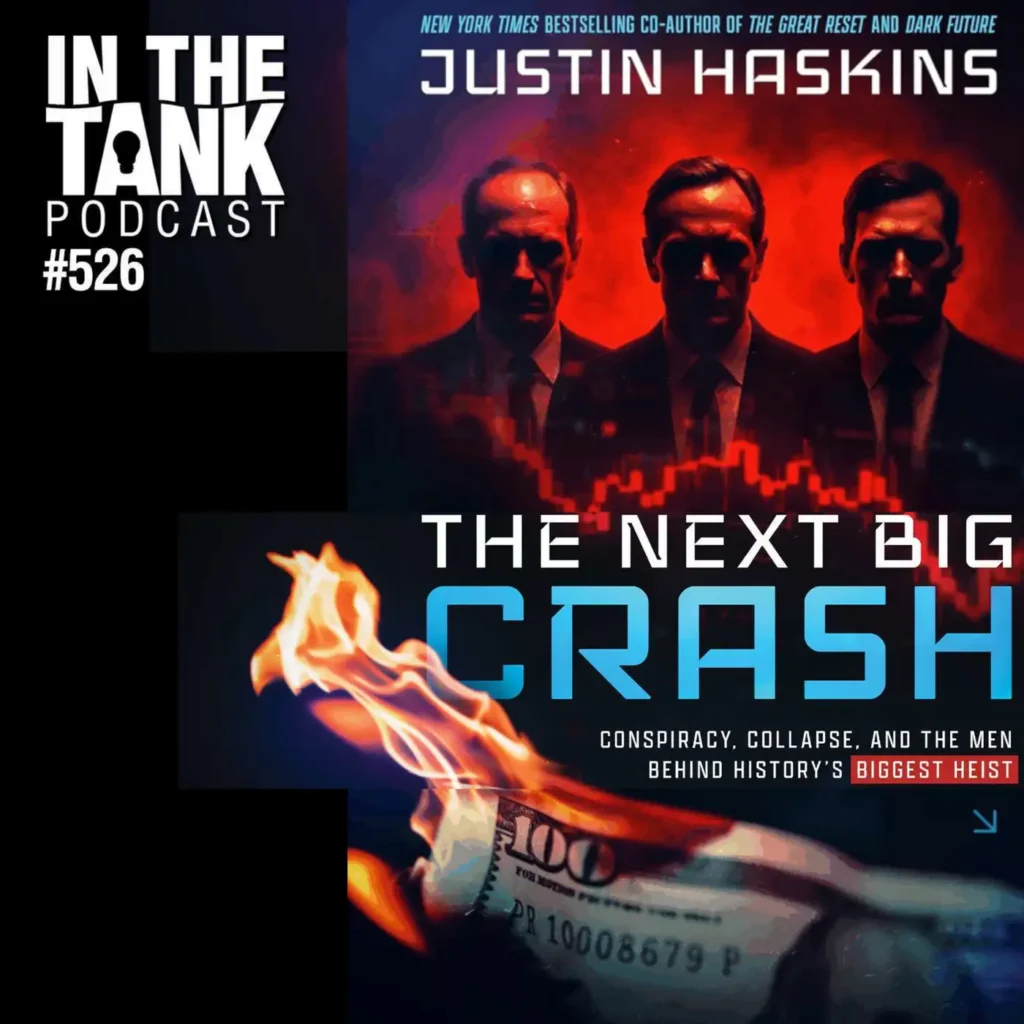Charlie Kirk and Brent Hamachek of Turning Point USA were the featured guests at a sold-out event at The Heartland Institute’s Andrew Breitbart Freedom Center on February 8 to talk about their book Time for a Turning Point, a road map on how to return to a free America, with an emphasis on reaching our youth and engaging them in the process.
Kirk, a graduate of Wheeling High School, founded Turning Point USA (a 501(c)3 nonprofit organization) in 2012 when he was 18 years old to teach America’s youth about the free-market and small-government vision of our Founding Fathers. In just four years, the organization has established chapters on more than 1,100 high school and college campuses across America.
Now 23 years old, Kirk has appeared on Fox News, CNBC and Fox Business News more than 200 times. In addition to his entrepreneurial political endeavors, Kirk plays every type of saxophone, was captain of his school’s varsity basketball and football teams and is a proud Eagle Scout. He is now taking courses toward a college degree.
Co-author, Brent Hamachek, is a business owner, entrepreneur, Turning Point USA Advisory Council member, author of six Turning Point USA campus publications, frequent public speaker, and energetic champion of liberty. Besides being a high honors graduate from Lake Superior State University and an honors graduate from the Graduate School of Banking at the University of Wisconsin, Hamachek has also studied theology.
Kirk kicked off the event expressing his appreciation to The Heartland Institute for helping his new organization get off on the right foot. Way back in the early days of Turning Point USA, Kirk said, he needed partners in the cause. Heartland’s Joe Bast and Jim Lakely didn’t laugh at an 18-year-old kid who wanted to start an organization with the same ideals as those that were honored by The Heartland Institute: liberty, freedom, free markets, and small government. Heartland provided help with literature to distribute, encouragement and good will. This partnership is still ongoing.
Current Unrest on Campus
In light of the recent rioting at the University of California – Berkeley, and what has been occurring on college campuses all across the country since the election of President Trump, Kirk felt the urgency to speak about it. The riot at UC-Berkeley, he said, raised some big questions about the future of the free speech movement. What happened at Berkley was not an isolated incident, he said. The Left may disguise itself as tolerant, but it is not. Victimhood has become a virtue. The Left hates that alternate ideas are given any room to exist in the public square – let along that others might be receptive to them.
The night Breitbart’s Milo Yiannopoulos arrived on campus to speak at Berkeley, 1,500 people showed up to protest. But once the sun went down, the protests turned violent, as roughly 150 black-clad, anti-fascist radicals with clubs and shields lit fires, hurled Molotov cocktails, smashed windows and caused enough of a scene to achieve their objective: deny Yiannopoulos the opportunity to spread what they view as dangerous hate speech at the university’s new Martin Luther King Jr. Student Union Center.
Did you know that last year Berkeley received $134 million from the federal government, which amounts to over half of its funding?
Kirk then spoke of how the student senate at Santa Clara University recently voted down an effort to start a chapter of Turning Point USA, marking the latest battle over free speech and tolerance on largely liberal campuses. The Associated Student Government voted Feb. 2 16-to-10 at a meeting where six Turning Point directors were present to reject the group’s bid to become a Student Recognized Organization. The perfunctory meeting turned testy when 300 students and faculty showed up to protest Turning Point USA. After Santa Clara’s decision, Kirk decried its decision on Fox News on February 2, 2017.
“If you disagree with the leftist orthodoxy, they’re just going to call you a racist,” Kirk said. “[Our] right to assemble and [our] right to free speech have been completely barred by leftists on campus that are silencing them just because they disagree.”
And what about the liberal students who couldn’t accept that Trump was elected president and are depressed? Kirk related how many college campuses offered after Trump’s election hug therapy, coloring-book therapy, pet-a-dog therapy, “cry-in’s,” hot chocolate and cookies, arts and crafts sessions, and Play-Doh to cope with student depression. Are these kids in college or in preschool? Their lack of maturity in dealing with disappointment is alarming. Yet colleges are enabling this behavior, molding a generation of wimpy kids who are unable to cope with reality.
As Kirk related, what follows are common practices that exist on many colleges and universities.
- Microaggressions, which perceive racism existing everywhere as a way to sensor speech.
- Gender pronouns such as she and he are not permitted to be used, instead a gender neutral pronoun such as “xe” is used
- Trigger warnings could be contained in writing, in an images, or exist in concepts which could act as a trauma trigger that calls for a safe place.
- Safe places where students who are upset so they don’t have to face reality.
Julia vs Julio, Modeled After the ‘Pencil Story’ of Milton Freeman
The stories of both fictional characters, Julia and Julio, are found in the Chapter 2, “Back to America’s Future,” in Kirk and Hamachek’s book. Kirk believes this is the most-moving and effective part of the book.
In May 2012, the Barack Obama Re-election Campaign posted on its website a slideshow titled “The Life of Julia.” Its purpose was to show how the fictional Julia would benefit from big-government programs from cradle to grave.
Julia’s story, intended to evoke affection toward Obama and big government, didn’t move Kirk the way the campaign intended. As Kirk related in his book, “the only reason that Julia is in need of government assistance to get through her life is because government itself has so interfered with the working of free markets and has corrupted the initiative and self-confidence of its citizens.”
With this in mind, Charlie Kirk presents an alternate story about the life of Julio starting at age 5 through age 75. While Julia’s life was supported on the backs of her fellow citizens, Julio started with nothing but was able to pull himself up by his bootstraps and be a contributing member of society. Kirk warns that the choice of the kind of America we get is still in our hands.
Ending the Game of Loans (a Liability Among Singles)
Kirk gave considerable attention to the student loan crisis. An entire chapter of his book deals with the issue of the federal government holding more than 90 percent of the nation’s outstanding student loans.
There is a vast misunderstanding of the student loan bubble, Kirk said. With an environment in which going to college is often considered necessary if a young person desires a good-paying job, a college education is encouraged and pushed – even if young people aren’t college material. This results in too many young people attending colleges and universities.
Students will borrow money to attend college, many times those with low academic rankings. They will drop out of school, not get a good job, but will still have a pile of student debt to pay back. Blacks are especially affected by loans they will never be able to pay back, Kirk said. Many young people who borrow before accessing the real cost of their loan believe the federal government might forgive their loans at some future time.
Charlie Kirk quoted these statistics: 1) The average loan is $32,000, when the majority of young people don’t even receive a diploma. 2) 59 percent of graduates will leave college with a debt of at least $40,000. Conclusion: Telling students they need to go to college to be successful is dangerous.
As to how parents allow their children to go into debt, Charlie Kirk spoke of a culture that has become perfectly fine with debt. It’s actually a scam. The federal government – we taxpayers – give $46 billion annually to universities and colleges. There should be a law, Kirk said, stating that no dollars given by the federal government should ever be used for administrative costs – which have skyrocketed. Another law, he said, is needed to take the tax-free status away from endowments. Endowments should be used for student scholarship and finance, not to feather a university’s nest.
Charlie Kirk and the 2016 Election
Kirk said that during the 2016 Presidential election cycle he sensed a growing frustration on the part of many Americans with the general direction of the nation, due to the abandonment of the principles of free markets and limited government upon which America was founded.
Kirk was asked to join the inner circle of the Trump campaign in the last 70 days before the November, 2016 election. He worked directly with Eric, Ivanka, and Donald Trump Jr. to attract the millennial vote.
As Election Day drew near, Kirk was asked by Politico if Trump had any chance of winning. Charlie said he thought Trump would win Pennsylvania, Ohio and Michigan – and, of course, the election. The only state he left out was Wisconsin. Hamachek added that if it wasn’t Kirk’s help in getting out the millennial vote, the presidential election would have turned out differently.
When Kirk was asked if there was a moment when he knew he wanted to do what he was now doing, he spoke of always having a passion for politics. He said he can’t remember when he didn’t want to get into a debate with his teachers. Early on, Kirk said he realized a peer-to-peer messaging system was needed. Turning Point USA was less about a movement to be created than it was about a movement that was waiting to happen.
And what a contrast between Kirk’s name recognition at the Republican Convention of 2012 and that of 2016! When attending the 2012 convention, Kirk explained it much like “there was no room in the inn.” What a contrast in 2016 when Kirk not only spoke at the GOP Convention, but he also worked for the Trump campaign.
When asked how to explain Bernie Sanders’ success among young people, Kirk attributed it partly to the lackluster appeal of Hillary Clinton. Sanders preached of the Utopia students were hearing from their professors. As to how to approach a supporter of Sanders, Kirk suggested the following strategy: Ask this question, “Do you trust government?” If the answer is “no,” then ask, “Why do you want to make it bigger?” Use that as a launching point to explain the freedom-sucking nature of big government.
Kirk said he believes that most young people would not be for socialism if they understood its ideology. Instead, they “would flee to the hills when presented with a better idea than socialism.”
In Conclusion
Many of those in attendance didn’t think it wise for conservative students to fight back against professors who use insulting and nasty rhetoric against them – which could result in suspension or bad grades. Rather, parents should step forward and make their voices heard.
Terrorists who are participating in rallies on college campuses, at airports, and at other venues throughout this nation – many who are paid professionals funded by George Soros – are using a tactic from Alinsky’s Rules for Radicals. Don”t debate, just silence your opposition through intimidation, threats, and violence. This tactic has resulted in conservative organizations on college campuses feeling uncomfortable in bringing conservative speakers on campus to speak – and in giving voice to pro-illegal immigrant organization and individuals to rail against those who are enforcing the law to protect those who have broken the law.
Upcoming free events at The Heartland Institute. To register, click on the title of the programs:
- Defending Free Speech
Wednesday, February 24, 2017
5:30 PM – 7:30 PM Arlington Heights, Illinois - The Coming Death and Future Resurrection of American Higher Education
Wednesday, March 1, 2017
5:30 PM – 7:30 PM Arlington Heights, Illinois - Collateral Damage: Forgotten Casualties of the Left’s War on Coal
- Wednesday, March 8, 2017
5:30 PM – 7:30 PM Arlington Heights, Illinois - Vaping: How Government Regulation Can Kill Innovation
Wednesday, March 15, 2017
5:30 PM – 7:30 PM Arlington Heights, Illinois




